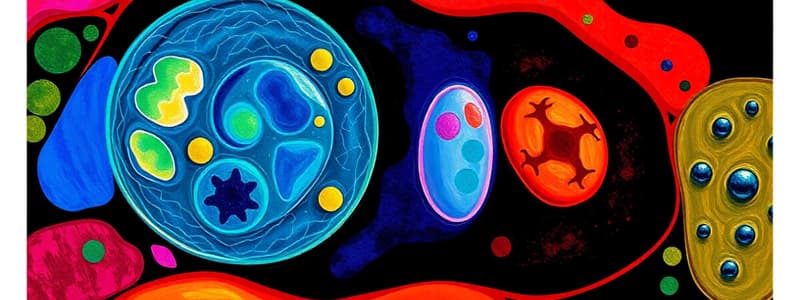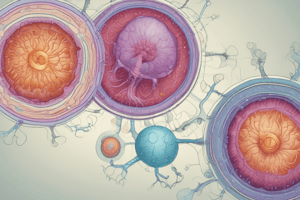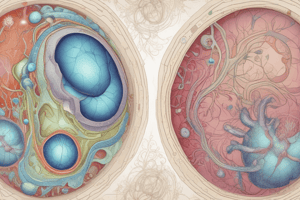Podcast
Questions and Answers
What is the primary significance of embryology in biological studies?
What is the primary significance of embryology in biological studies?
- It focuses solely on the study of genes.
- It is irrelevant to evolutionary relationships.
- It only examines cellular structures.
- It helps understand human developmental processes and congenital defects. (correct)
Which developmental process is directly responsible for producing specialized cell types in the embryo?
Which developmental process is directly responsible for producing specialized cell types in the embryo?
- Gastrulation
- Morphogenesis
- Cell Differentiation (correct)
- Growth
During which stage of embryonic development do the primary germ layers form?
During which stage of embryonic development do the primary germ layers form?
- Organogenesis
- Fertilization
- Gastrulation (correct)
- Cleavage
What is a key function of the mesoderm germ layer?
What is a key function of the mesoderm germ layer?
Which process involves the duplication of cells and is essential for the embryo's growth?
Which process involves the duplication of cells and is essential for the embryo's growth?
What role does morphogenesis play in embryonic development?
What role does morphogenesis play in embryonic development?
Which germ layer is responsible for forming the respiratory system lining and associated organs?
Which germ layer is responsible for forming the respiratory system lining and associated organs?
What is cleaving in the context of embryonic development?
What is cleaving in the context of embryonic development?
Which statement regarding the growth stage of embryonic development is true?
Which statement regarding the growth stage of embryonic development is true?
What marks the end of embryonic development?
What marks the end of embryonic development?
What occurs during gastrulation that is vital for development?
What occurs during gastrulation that is vital for development?
Which of the following best describes induction in developmental biology?
Which of the following best describes induction in developmental biology?
What is the primary consequence of teratogens during pregnancy?
What is the primary consequence of teratogens during pregnancy?
How do genetic factors influence development?
How do genetic factors influence development?
What role does apoptosis play in development?
What role does apoptosis play in development?
Which factor influences cellular interactions during development?
Which factor influences cellular interactions during development?
What is a key characteristic of fetal development distinct from embryonic development?
What is a key characteristic of fetal development distinct from embryonic development?
What impact can environmental factors have on development?
What impact can environmental factors have on development?
In what way do hormonal influences affect development?
In what way do hormonal influences affect development?
What is the significance of embryology in understanding development?
What is the significance of embryology in understanding development?
Flashcards
What is Embryology?
What is Embryology?
Study of how a single fertilized egg develops into a complex organism.
What is Fertilization?
What is Fertilization?
The fusion of a male sperm and a female egg.
What is Cleavage?
What is Cleavage?
Rapid cell division of the zygote, creating a hollow ball of cells.
What is Gastrulation?
What is Gastrulation?
Signup and view all the flashcards
What is Organogenesis?
What is Organogenesis?
Signup and view all the flashcards
What is Cell Differentiation?
What is Cell Differentiation?
Signup and view all the flashcards
What is Morphogenesis?
What is Morphogenesis?
Signup and view all the flashcards
What is the Ectoderm?
What is the Ectoderm?
Signup and view all the flashcards
What is the Mesoderm?
What is the Mesoderm?
Signup and view all the flashcards
What is the Endoderm?
What is the Endoderm?
Signup and view all the flashcards
Gastrulation
Gastrulation
Signup and view all the flashcards
Induction
Induction
Signup and view all the flashcards
Fetal Development
Fetal Development
Signup and view all the flashcards
Teratogens
Teratogens
Signup and view all the flashcards
Apoptosis
Apoptosis
Signup and view all the flashcards
Genetic Factors
Genetic Factors
Signup and view all the flashcards
Environmental Factors
Environmental Factors
Signup and view all the flashcards
Hormonal Influences
Hormonal Influences
Signup and view all the flashcards
Cells Signaling Pathways
Cells Signaling Pathways
Signup and view all the flashcards
Cellular Interactions
Cellular Interactions
Signup and view all the flashcards
Study Notes
Introduction to Embryology
- Embryology studies the development of embryos and fetuses.
- It examines the transformation of a single fertilized egg into a complex organism.
- This involves cell division, differentiation, and morphogenesis.
- Embryology helps understand human development, congenital defects, and evolutionary relationships.
Stages of Embryonic Development
- Fertilization: Fusion of sperm and egg, forming a zygote.
- Cleavage: Rapid cell division of zygote, forming a blastula.
- Gastrulation: Cell rearrangement, forming three germ layers (ectoderm, mesoderm, endoderm), initiating organogenesis.
- Organogenesis: Development of organs and organ systems from germ layers (heart, lungs, brain, limbs).
- Growth and Development: Continued maturation of embryo/fetus, increasing complexity and differentiation.
- Birth: Completion of embryonic development, transition to neonatal period.
Key Developmental Processes
- Cell Division: Mitosis duplicates cells, increasing structural complexity.
- Cell Differentiation: Cells specialize, adopting unique functions due to activation/deactivation of specific genes.
- Morphogenesis: Form and structure development through cell migration, signaling pathways, regulated cell death, adhesion, and cytoskeleton.
- Growth: Increase in size and mass through cell division, expansion, and tissue/organ growth. Proper nutrient and hormonal supply needed.
Germ Layers
- Ectoderm: Forms nervous system, epidermis, hair, and nails.
- Mesoderm: Forms musculoskeletal, circulatory, excretory, and reproductive systems.
- Endoderm: Forms digestive tract, respiratory system, liver, and pancreas linings.
Other Important Concepts
- Gastrulation: Crucial stage for germ layer establishment; cell movement essential, defects lead to birth defects.
- Induction: Signaling between cells directs neighboring cell/tissue development; crucial proteins and signaling molecules involved.
- Fetal Development: Continued growth and differentiation after embryonic stage; organ maturation.
- Teratogens: Substances (drugs, radiation, infections) causing developmental abnormalities/birth defects.
- Apoptosis: Programmed cell death for sculpting structures and elimination of unwanted cells.
Key Influences on Development
- Genetic Factors: Blueprint for structure and function; mutations impact development.
- Environmental Factors: Nutrition, temperature, radiation, and chemicals influence developmental processes.
- Hormonal Influences: Significantly regulate and direct embryonic and fetal development.
- Cells Signaling Pathways: Enable communication between cell types and tissues, guiding growth, differentiation, & tissue/organ development.
- Cellular Interactions: Shape embryonic architecture through cell-to-cell communication.
Conclusion
- Embryology provides insight into life's development.
- Understanding these processes helps address pregnancy problems and mechanisms of congenital defects.
Studying That Suits You
Use AI to generate personalized quizzes and flashcards to suit your learning preferences.




